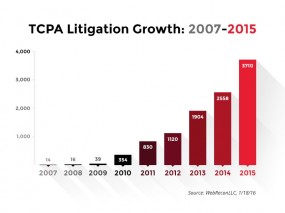Portfolio Recovery Associates LLC (PRAA) will pay $18 million to resolve multidistrict litigation accusing the debt collection company of violating the Telephone Consumer Protection Act (TCPA) by making autodialed phone calls to consumers without their consent, according to documents filed Monday in California federal court.
Editor’s Note: Multidistrict Litigation (MDL) is a special federal legal procedure designed for handling complex cases. MDL cases occur when civil actions involving one or more common questions of fact are pending in different districts. In order to efficiently process multiple cases that could involve hundreds (or thousands) of plaintiffs in multiple different federal courts that all share common issues, those cases are consolidated and transferred to a single court for all pre-trial proceedings and discovery.
In this instance the MDL originally involves four (4) separate actions. The various actions that were consolidated in the MDL all involved allegations that PRAA violated the TCPA by placing debt collection calls to consumers’ cellular phones using an Automated Telephone Dialing System (ATDS).
The Plaintiffs in the case (In re Portfolio Recovery Associates, LLC, Telephone Consumer Protection Act Litigation, Case No. 3:11-md-02295, United States District Court, Southern District of California) filed an Unopposed Motion for Preliminary Approval of Class Action Settlement and Class Certification that lays out the terms of the proposed settlement. A hearing to approve the proposed settlement is set for June 6, 2016. A copy of that motion can be found here. The Defendants in the case are the aforementioned PRAA and PRA Group, Inc.
The Proposed Settlement
The proposed settlement consists of the following:
- Defendants will pay $18,000,000. Settlement Class members will receive a pro rata share of the balance of that amount after payment of notice and administration costs not to exceed $3,325,000, attorney’s fees not to exceed $5.4 million, litigation costs, and incentive awards for each of the named Plaintiffs not to exceed $6,250 each.
- The injunctive relief affirmed in Meyer v. Portfolio Recovery Associates, LLC, 707 F.3d 1036 (9th Cir. 2012) will be continued and expanded. In sum, the injunction will prohibit PRA from using its Avaya Proactive Contact Dialer to place calls to any person’s cellular telephone numbers without prior express consent.
- The Agreement defines the Class as follows: All natural persons residing in the United States who received one or more telephone calls from an autodialer or a predictive dialer operated by Defendants to such person’s cellular telephone number between December 23, 2006 and July 1, 2013, inclusive, and who are listed in the csv data file titled pra_outbound_dial_list_20140304.zip produced
to Plaintiffs’ counsel. (The data file identifies approximately 7.4 million Class Members as meeting the definition above.)
- A consent decree entered into with this settlement provides an injunction that prohibits PRA from using its Avaya Proactive Contact Dialer to place calls to any person’s cellular telephone numbers without prior express consent.
- Class Members will receive an opportunity to opt-out of the Class. Those that do not (“Settlement Class Members”) are eligible to claim and receive a pro rata share of the remaining common fund; the recovery for each Settlement Class Member who submits a valid claim will depend on the total number of valid claims. There is no minimum or maximum amount that any Settlement Class Member is entitled to receive.
- Any remaining funds will go to the designated Cy Pres Recipient. The Parties propose any cy pres relief be paid to the National Association of Consumer Advocates, in particular for its work with the Federal Communications Commission to ensure that consumers’ rights are maintained under the TCPA. No funds shall revert to Defendants.
insideARM Perspective
The TCPA insanity continues.
The TCPA is 1991 legislation. It was enacted before the widespread use of cell phone. It was designed to prohibit telemarketers that randomly dialed phone numbers of people where there was no prior business relationship. In a February 5, 2016 Blog posted in the U.S. Chamber Institute for Legal Reform website, a quote from Becca Wahlquist, an attorney for Snell & Wilmer, described the TCPA as “A destructive force that threatens companies with annihilation for technical violations that cause no actual injury or harm to any consumer.”
The blog also noted that “TCPA case filings increased over 940% during the five-year-period between 2010 and 2015.” The following chart accompanied the article:
insideARM has written extensively on recent TCPA litigation as well as the July, 2015 FCC order regarding the TCPA. Last week at our Fourth Annual Larger Market Participant Summit a panel of attorneys from the Drinker, Biddle & Reath LLP law firm provided participants with an excellent overview of the Appeal of that order. Neither the panel members or anyone who attended that session was willing to handicap the potential outcome of that appeal. The ARM industry should be responding to all published TCPA opinions and modify practices accordingly.




![Photo of Tim Bauer [Image by creator from ]](/media/images/tim-bauer.2e16d0ba.fill-500x500.jpg)

![the word regulation in a stylized dictionary [Image by creator from ]](/media/images/Credit_Report_Disputes.max-80x80.png)
![Cover image for New Agent Onboarding Manuals resource [Image by creator from insideARM]](/media/images/New_Agent_Onboarding_Manuals.max-80x80_3iYA1XV.png)


![[Image by creator from ]](/media/images/New_site_WPWebinar_covers_800_x_800_px.max-80x80.png)
![[Image by creator from ]](/media/images/Finvi_Tech_Trends_Whitepaper.max-80x80.png)
![[Image by creator from ]](/media/images/Collections_Staffing_Full_Cover_Thumbnail.max-80x80.jpg)
![Report cover reads One Conversation Multiple Channels AI-powered Multichannel Outreach from Skit.ai [Image by creator from ]](/media/images/Skit.ai_Landing_Page__Whitepaper_.max-80x80.png)
![Report cover reads Bad Debt Rising New ebook Finvi [Image by creator from ]](/media/images/Finvi_Bad_Debt_Rising_WP.max-80x80.png)
![Report cover reads Seizing the Opportunity in Uncertain Times: The Third-Party Collections Industry in 2023 by TransUnion, prepared by datos insights [Image by creator from ]](/media/images/TU_Survey_Report_12-23_Cover.max-80x80.png)
![Webinar graphic reads RA Compliance Corner - Managing the Mental Strain of Compliance 12-4-24 2pm ET [Image by creator from ]](/media/images/12.4.24_RA_Webinar_Landing_Page.max-80x80.png)